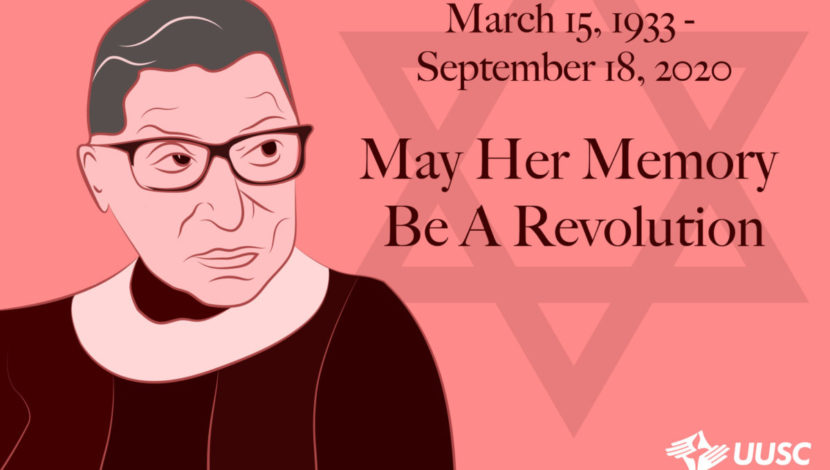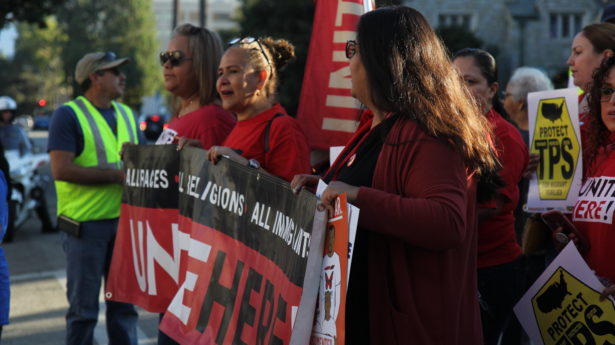The Unitarian Universalist Service Committee advances human rights through grassroots collaborations.
Justice Ginsburg’s Legacy: Defending Human Rights, Democracy, and Dissent

By Rachel Gore Freed on September 22, 2020
Whenever I hear, see, or read the word, “dissent,” I think of the late Justice Ruth Bader Ginsburg. I remember reading her famous long dissents early in my legal career, and more recently, “I Dissent” is the title of the children’s book about her life that I’ve been reading to my kids at night.
Justice Ginsburg will be remembered for her many impacts on our legal system. She also possessed an ability to digest complex legal arguments and precedent when faced with issues affecting real lives, and communicate about those issues in a way that was compelling and humanistic. Her focus on discrimination and equal rights was not abstract; her opinions had teeth and changed lives.
One of the opinions that I reflect on today centers around the complex intersections of gender and race entwined with a decision on whether the death penalty should be inflicted as a proportional punishment for the crime of raping an adult woman. In 1977, in Coker v. Georgia, Justice Ginsburg wrote an amicus brief to the Supreme Court, on behalf of the National Organization for Women’s Legal Defense and Education Fund and the Women’s Law Project, advising the Court to reject the punishment based on outdated vestiges of patriarchy in the law. The brief highlighted the way rape laws were designed—their initial purpose being to protect men’s property. The origin of the laws came about during a time when marital rape was not considered a crime, which can only be understood through the patriarchal lens of property rights and stereotypes that emphasized women’s dependence on men. Under common law, a married woman could not be raped by her husband because she belonged to him.
Ginsburg’s critiques of this form of punishment did not stop short with a focus on women’s subordination and the historical underpinnings of the law, but went on to address the racial dynamics of rape laws and the disproportionate impacts of the criminal justice system on Black men. The Court opinion did not mention this analysis in the final decision but it concluded that the death penalty was a disproportionate penalty, uplifting the importance of protecting a woman’s sexual autonomy over prosecuting the violation of a man’s property.
Justice Ginsburg was not only a fierce human rights advocate but was deeply committed to our democracy, the role of the court, and the separation of powers within our three branches of government. Her approach to issues such as workplace and gender discrimination involved reflecting on the laws and their impact, while pushing Congress to legislate and do its job or upholding the role of state legislatures to be responsive to their electorate.
Justice Ginsburg inspired me to be true to my convictions with an openness to being challenged and analyzing an issue from all angles. She was a woman who could reach informed judgements without judgement, something worth striving for.
Now, Justice Ginsburg’s dissents seem more famous than her concurrences, as she has described them as “appealing to the intelligence of a future day.” As we mourn and move forward, we must remember that the future day is now and we need not wait to address the very real consequences of discrimination in the face of civil rights. Today we can be real about the impacts of our laws and policies and continue to push for a more just society.
Stay tuned at UUSC’s blog for a deep dive analysis into what’s at stake for human rights in this political moment with our judiciary, for voting rights, and for our democracy.
***
About UUSC: Guided by the belief that all people have inherent worth and dignity, UUSC advances human rights globally by partnering with affected communities who are confronting injustice, mobilizing to challenge oppressive systems, and inspiring and sustaining spiritually grounded activism for justice. We invite you to join us in this journey toward realizing a better future!
Photo Credit: UUSC

